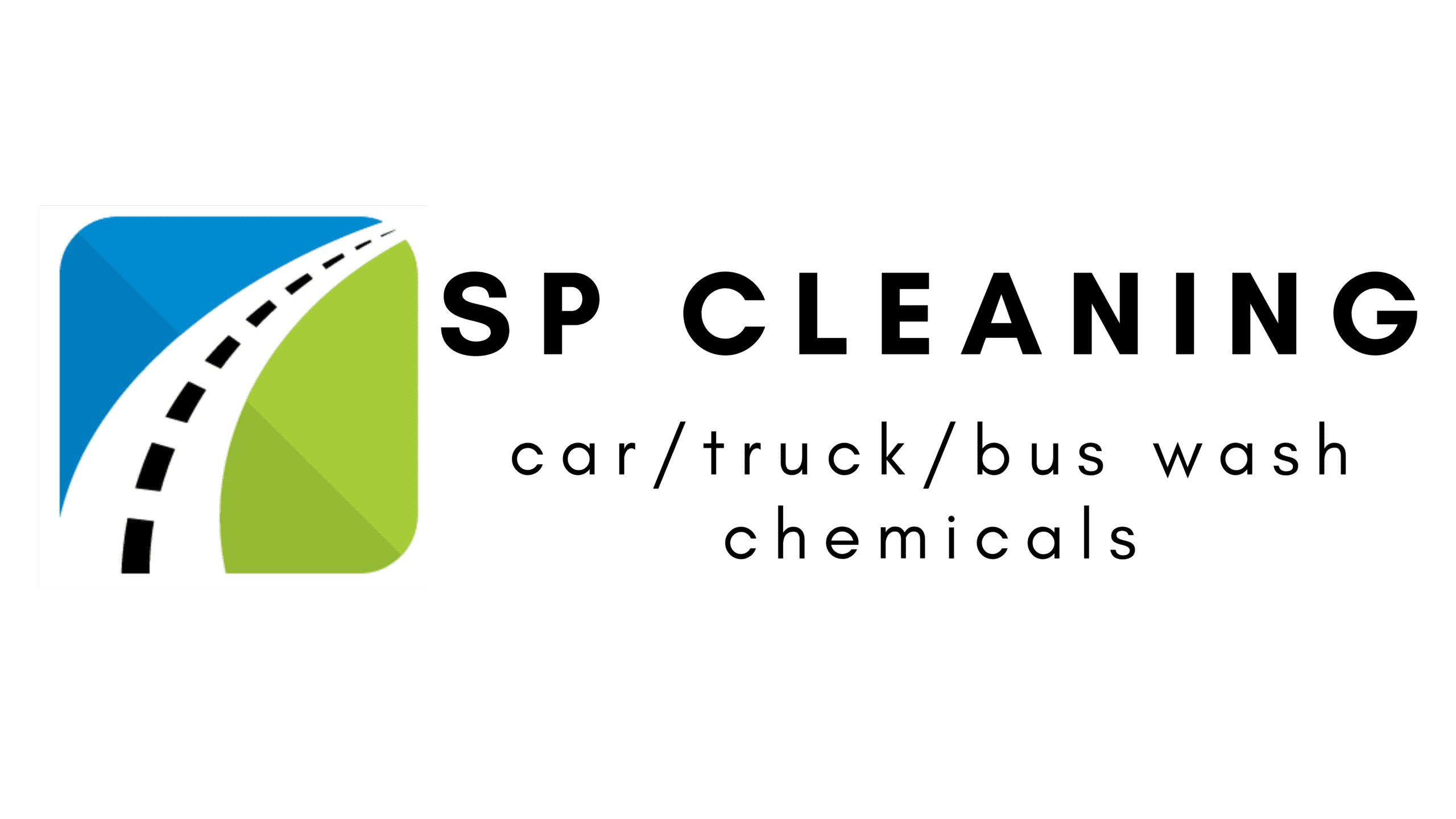I remember the first time I washed my truck. Excited to give it a fresh look, I grabbed the nearest bottle of soap and got to work. Little did I know that choosing the touchless truck wash soap could have long-term consequences for my beloved vehicle. Learn more about the touchless truck wash soap and its effects. Regular truck washing is not just about maintaining its appearance; it’s also crucial for proper maintenance. However, many people hold misconceptions about using any soap to wash their trucks.
Using the wrong soap can have adverse effects on your truck’s exterior. Improper soaps may leave behind unsightly spots or even strip away the protective coating over time. That’s why it’s essential to review the instructions and choose a product specifically designed for cleaning vehicles. Factors like concentration, types of dirt, and even regional variations should be taken into account when making your decision.
1. Importance of Proper Soap Selection
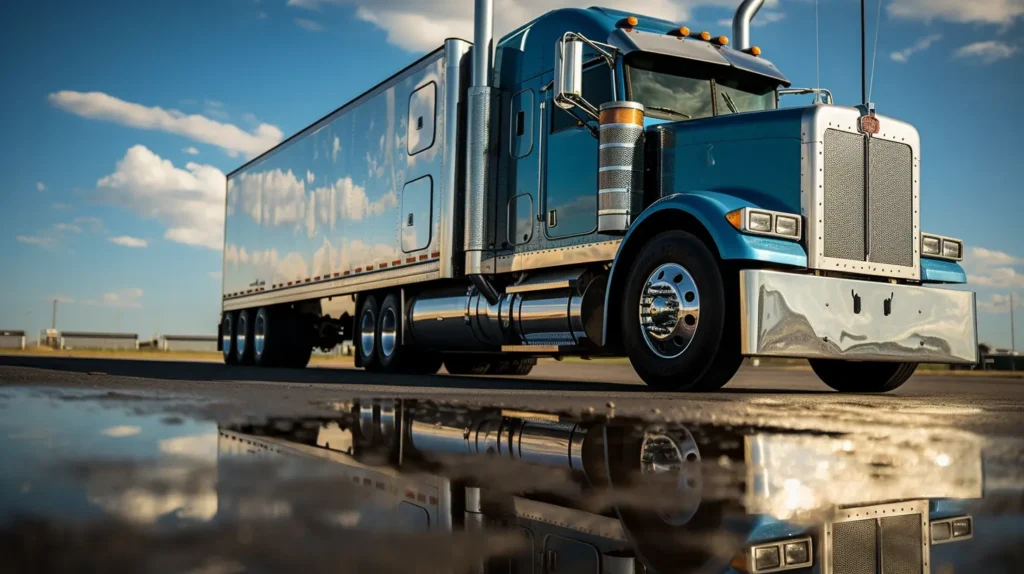
Using the right soap to wash your truck is crucial for maintaining its appearance and protecting its exterior. The wrong soap can lead to various consequences that can be costly and time-consuming to fix. Let’s take a closer look at why proper soap selection matters.
1. Potential Consequences of Improper Soaps
- Damage to the paintwork and protective coatings: Using harsh or abrasive soaps can strip away the protective layers on your truck’s paint, leaving it vulnerable to scratches, swirl marks, and even peeling. This can significantly decrease the resale value of your vehicle.
- Fading or discoloration of the truck’s exterior: Certain soaps contain chemicals that are too harsh for automotive finishes. These chemicals can cause fading or discoloration over time, making your once vibrant truck look dull and worn out.
- Corrosion and rust formation in vulnerable areas: Some soaps may not rinse off completely, leaving behind residue that can accumulate in crevices and hard-to-reach areas of your truck. Over time, this residue can lead to corrosion and rust formation, especially in vulnerable spots like undercarriages or around trim pieces.
To avoid these potential consequences, it is essential to follow some general guidelines when washing your truck.
2. General Guidelines for Washing Trucks
- Use a pH-neutral soap specifically designed for automotive use: Look for soaps labeled as “pH-neutral” or “automotive-grade.” These types of soaps are formulated to effectively clean without damaging the paintwork or protective coatings on your truck.
- Avoid abrasive materials that can scratch the surface: Instead of using rough sponges or brushes, opt for microfiber cloths or mitts specifically made for truck washing. These tools are gentle on the paint while still providing effective cleaning power.
- Rinse thoroughly to remove all soap residue after washing: Soap residue left on your truck’s surface can lead to streaks and spots. Make sure to rinse your truck thoroughly, paying extra attention to areas where soap might accumulate, such as door jambs and wheel wells.
By following these guidelines and using the right soap for your truck, you can keep its exterior looking great while protecting it from potential damage.
2. Understanding Different Soaps for Truck Washing
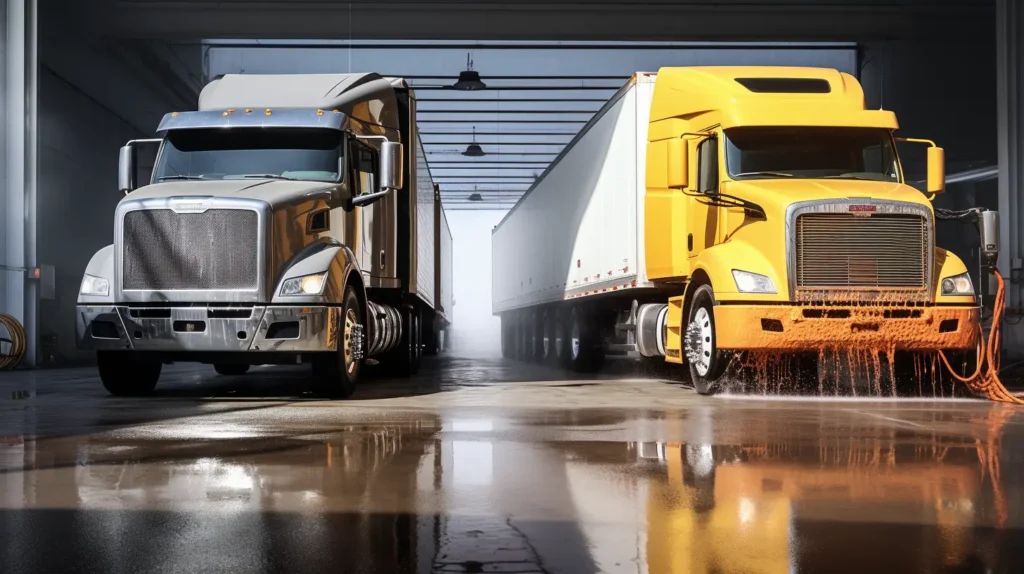
Using the right soap is crucial. Let’s dive into understanding the different types of soaps available and why it matter which one you choose.
1. Truck Wash Soaps vs. Household Detergents
Truck wash soaps are specifically formulated with gentle surfactants that are suitable for vehicles. These soaps are designed to effectively remove dirt, grime, and road contaminants without causing any harm to your truck’s finish. They contain ingredients that help maintain the protective wax layer on your vehicle, keeping it shiny and protected.
On the other hand, household detergents like dish soap may seem like a convenient option, but they can actually do more harm than good when used on your truck. Unlike truck wash soaps, household detergents often contain harsh chemicals that can strip away the protective wax layers on your vehicle. This leaves your truck vulnerable to damage from UV rays, water spots, and other environmental factors.
2. Risks of Using Dish Soap on Trucks
Using dish soap on trucks may be a common practice for some people, but it’s important to understand the risks involved. Dish soap typically has a high alkaline content that can be damaging to paintwork. It can cause fading or discoloration over time, leaving your truck looking dull and worn out.
Another drawback of using dish soap is its lack of lubricity. Truck wash soaps are designed with lubricating agents that help reduce friction between the sponge or mitt and your truck’s surface. This minimizes the risk of scratches during the washing process. Dish soap lacks this lubricating property, increasing the chances of unintentional scratches or swirl marks appearing on your truck’s paintwork.
3. The Science Behind Truck Wash Soaps
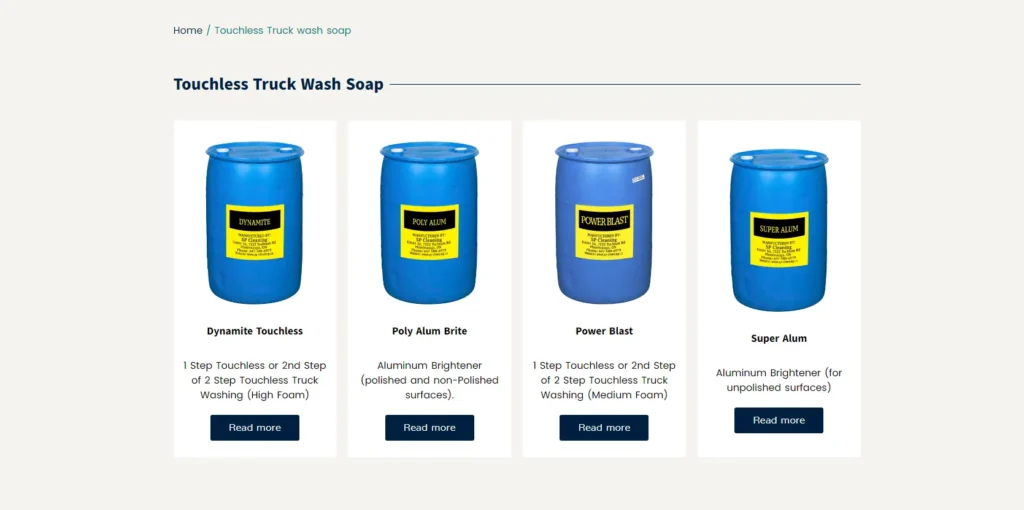
1. Soap Concentration and Truck Care
Proper dilution ratios are essential. Diluting the soap ensures effective cleaning without causing any damage to the vehicle’s paint or surface. If soap is over-concentrated, it may leave behind residue or streaks on the surface, making your truck look less than pristine. On the other hand, if soap is under-diluted, it may not provide sufficient cleaning power to remove dirt and grime effectively.
2. Foaminess and Cleaning Efficiency
Have you ever wondered why some Truck wash soaps produce more foam than others? Well, foam plays an important role in the cleaning process. When you apply a soapy foam to your truck’s surface, it helps loosen dirt particles from the paintwork. The increased foaminess indicates better coverage and cleaning efficiency during the washing process.
Choosing a soap with good foaming properties can enhance your overall results and make your truck shine like new. The foamy lather of muddy truck soap helps encapsulate dirt particles, preventing them from scratching or damaging the paint as you wash. So next time you’re shopping for Truck wash soap, keep an eye out for products that generate rich suds.
The foam also serves as an indicator of how well a soap is working while you’re washing your truck. As you scrub away at stubborn stains or grime, pay attention to how long the foam lasts on the surface. A high-quality Truck wash soap will maintain its foamy texture throughout the entire washing process.
4. Best Practices in Truck Washing
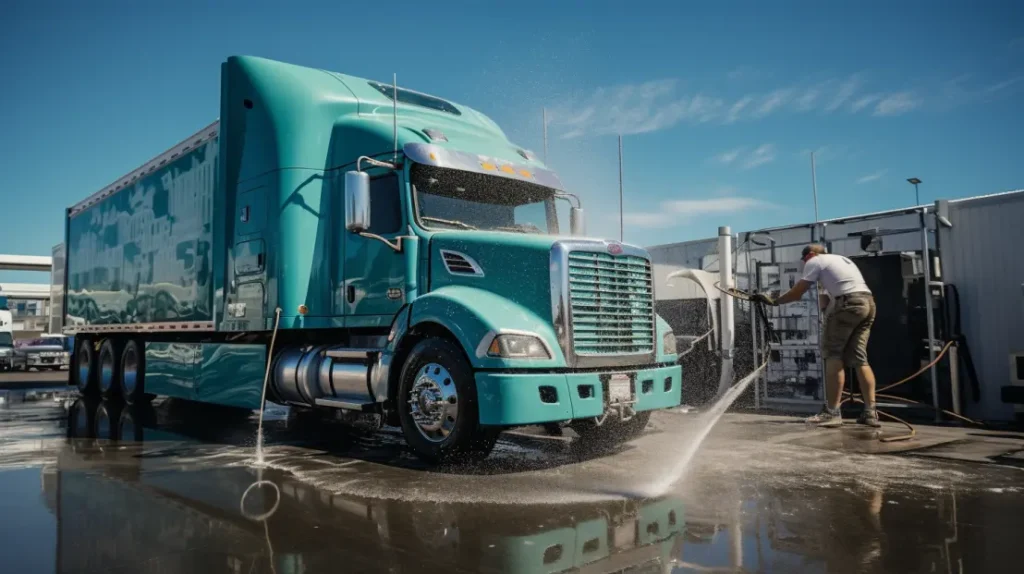
1. Step-by-Step Washing Guide
Following the right steps can make a big difference. Here’s a step-by-step guide to help you achieve the best results:
- Pre-rinse: Before you start washing, give your truck a good pre-rinse to remove any loose dirt and debris. This will make it easier to clean and prevent scratching during the washing process.
- Apply soapy water: Once your truck is pre-rinsed, it’s time to apply soapy water. Grab a sponge or mitt and dip it into a bucket of soapy water. Start applying the soap in straight lines, working from top to bottom. This method helps ensure even coverage and prevents streaks.
- Rinse thoroughly: After you’ve applied the soapy water, it’s important to rinse your truck thoroughly. Start rinsing from the top and work your way down, making sure to remove all traces of soap. This step is crucial for preventing any residue that could potentially damage your truck’s paintwork.
2. Drying Techniques Post-Wash
Once you’ve finished washing your truck, proper drying techniques are essential for achieving a spotless finish. Here are some tips on how to dry your truck effectively:
- Use a microfiber drying towel: To prevent water spots on your freshly washed truck, opt for a microfiber drying towel instead of traditional towels or chamois cloths. Microfiber towels are highly absorbent and gentle on the paint surface.
- Pat dry instead of rubbing: When drying your truck, avoid rubbing or scrubbing motions that can lead to swirl marks or scratches on the paintwork. Instead, gently pat dry with the microfiber towel in straight lines.
- Consider using a leaf blower: If you’re looking for a quick and efficient way to dry your truck without leaving any water spots, consider using a leaf blower. During winters, a truck wash is essential to effectively remove excess water from hard-to-reach areas like side mirrors and door handles using powerful airflow.
5. Additional Truck Cleaning Tips

1. Maintaining Your Truck’s Finish
Regular washing plays a crucial role in preserving your truck’s paintwork and protective coatings. It helps remove dirt, grime, and other contaminants that can damage the surface over time. To enhance the shine and provide added protection against the elements, consider applying wax or sealant periodically. These products create a barrier that shields your truck from UV rays, moisture, and pollutants.
It’s important to avoid using abrasive materials or harsh chemicals that can compromise the finish. Opt for gentle soaps specifically formulated for automotive use. These soaps are designed to effectively clean without causing any harm to the paint or protective coatings on your truck. Using a soft sponge or microfiber cloth will also help prevent scratches during the cleaning process.
2. Long-Term Truck Care Strategies
To ensure your truck remains in top condition for years to come, implementing a regular maintenance schedule is essential. This includes both washing and detailing your vehicle on a consistent basis. By doing so, you’ll be able to maintain its appearance and protect it from potential damage caused by environmental factors.
Using high-quality truck wash soaps and products is key when caring for your truck long-term. These specialized products, such as truck wash soap, are formulated with ingredients that effectively clean while being gentle on your vehicle’s surfaces. They help remove dirt, grime, and road debris without stripping away protective coatings or causing any damage.
In addition to using quality cleaning products, protecting your truck from environmental factors is crucial. UV rays from the sun can fade paint over time, while salt used on roads during winter months can cause corrosion if not properly cleaned off. Pollutants in the air can also settle on your truck’s surface and gradually deteriorate its finish. By regularly washing and applying protective coatings like wax or sealant, you create an extra layer of defense against these harmful elements.
Taking care of your truck’s finish not only keeps it looking great but also helps maintain its value. Regular washing, using quality soaps and products, and protecting against environmental factors are all essential components of long-term truck care. By following these strategies, you can ensure that your truck stays in optimal condition for many miles down the road.
6. Conclusion
7. FAQs
1. Does the type of soap I use to wash my truck really matter?
Yes, the type of soap you use to wash your truck does matter. Using a high-quality automotive soap specifically designed for vehicles helps maintain the paint’s integrity, removes dirt effectively, and prevents any potential damage caused by harsh chemicals found in household soaps.
2. Can I use regular dish soap to wash my truck?
While it may be tempting to use regular dish soap for convenience, it’s not recommended. Dish soaps are formulated for cutting through grease on dishes and can strip away protective wax coatings on your car wash or truck wash. Opt for a dedicated truck wash soap instead.
3. What are the benefits of using a specialized automotive soap?
Using a specialized automotive soap offers several benefits. These soaps are gentle on your truck’s paint, effectively remove dirt and grime without causing scratches or swirls, and are also suitable for truck wash. They often contain additives that help enhance shine and protect against UV rays, ensuring a clean truck.
4. How often should I wash my truck?
The frequency of washing your truck depends on various factors such as weather conditions, driving environment, and personal preference. As a general guideline, aim to wash your truck every 2-4 weeks to prevent buildup of dirt, road salt, bird droppings, or other contaminants that can potentially harm the paint.
5. Can I use any type of sponge or cloth to wash my truck?
It’s important to choose the right tools when washing your truck. Avoid using abrasive sponges or cloths that can cause scratches. Instead, opt for microfiber mitts or soft natural wool mitts that gently lift dirt away from the surface without scratching it.
6. Can you use dish soap to wash a truck ?
You might be wondering if you can use dish soap instead of truck wash soap. Well, the answer is yes, you can use dish soap to wash a truck , but it’s not recommended. Here’s why:
Dish Soap Can Strip Away Wax and Damage the Paint
Dish soap is designed to cut through grease and remove stubborn food stains from your dishes. However, its powerful cleaning agents can be too harsh for your truck’s paintwork. Dish soap can strip away any protective wax coating on your truck , leaving it vulnerable to damage from UV rays, dirt, and other environmental factors. It can also cause the paint to fade or become dull over time.
Truck Wash Soaps Are Specifically Formulated for Cleaning Vehicles
On the other hand, truck wash soaps are specially formulated to clean vehicles effectively without causing any harm. The best truck wash soap is designed to be gentle on your truck’s paint while still providing thorough cleaning power. truck wash soaps contain ingredients that help lift dirt and grime off the surface of your truck without scratching the paint or leaving residue behind.
Excessive Sudsing and Difficulty in Rinsing
One of the main issues with using dish soap on your truck is that it can create excessive sudsing. While this may seem fun at first, it can make rinsing off the soap more challenging. The bubbles from dish soap tend to stick around longer and can be stubborn to remove completely. This can result in residue being left on your truck’s surface, which can attract more dirt and make your truck look less clean.
To properly rinse off dish soap, you might need to use a lot of water and spend more time rinsing than you would with a truck wash soap. This not only wastes water but also adds unnecessary effort to the washing process.
In conclusion, while dish soap can technically be used to wash a truck, it is not the best choice. Truck wash soaps, specifically formulated with pressure washing chemicals, provide gentle yet effective cleaning without causing any harm to your truck’s paint or wax. They also make rinsing off the soap easier, ensuring a clean and residue-free finish. So, next time you’re washing your truck,
